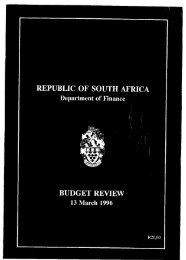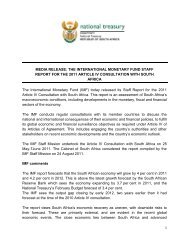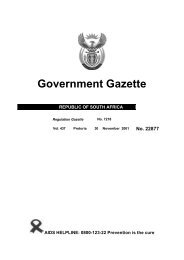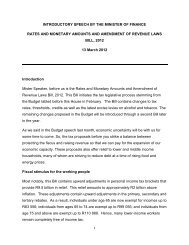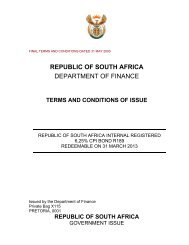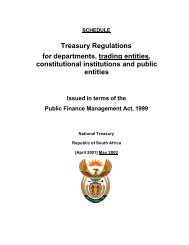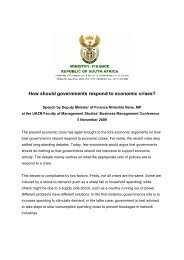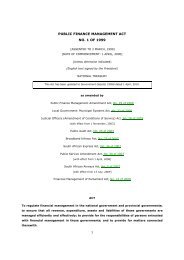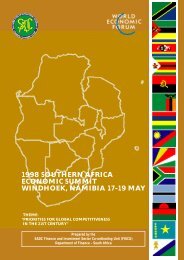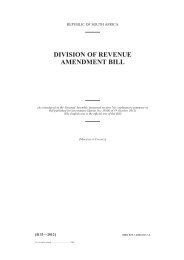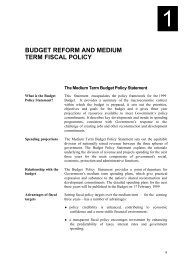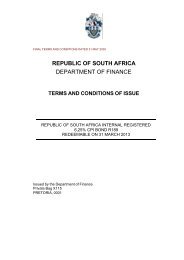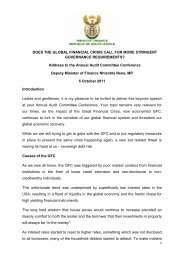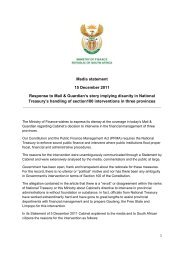StatsSA projects inter-provincial migrations to take place from 2005 - 2015 at much the same rate as between 1996 - 2001. Net five-year migration assumptions (positive denotes net in-migration and negative denotes net out-migration) into provinces from 2006 - 2011 are shown below: Province Increase / (decrease) Eastern Cape (323 622) Free State (58 514) Gauteng 533 410 KwaZulu-Natal 7 707 Limpopo (252 928) Mpumalanga (42 190) Northern Cape (28 167) North West (64 176) Western Cape 228 480 One consequence of this increase in population in the Western Cape is that every form of education and training in the province has experienced growth in numbers in the past five years: ECD sites, schools, FET colleges and ABET centres. The growth in learner numbers is, however, unpredictable. This makes planning of service delivery, especially classrooms and teachers, extremely complex. The data for the Western Cape public ordinary school system from 1995 - 2006 is provided in Table 1 below to illustrate the growth in learner numbers in the province and illustrates the first of the service delivery challenges faced by the WCED. While some provinces faced a decline in enrolments, the WCED continued to experience growth until 2004. The abnormal growth from 2003 - 2004 of 23 121 was mainly due to the relaxing of the intake/admission policy for Grade 1 learners that was in effect from 2000 (and also the reason for the decline in learner numbers from 1999 - 2000). The 2005 <strong>Annual</strong> Survey of Schools indicated no growth from 2004 to 2005, due mainly to this abnormal growth. The 2006 numbers are obtained from the CEMIS (Learner Tracking System) and reflect a substantial decrease from 2005 - 2006 (Note: this is the first year that CEMIS has been used and the department is in the process of verifying the numbers). Normal growth is expected again from 2006 - 2007. Table 1: Enrolment in public ordinary schools 1995 – 2006 Year Gr 1 Gr 2 Gr 3 Gr 4 Gr 5 Gr 6 Gr 7 Gr 8 Gr 9 Gr 10 Gr 11 Gr 12 Total 1995 99,158 84,963 80,921 79,199 76,789 72,293 68,795 67,473 61,079 50,698 41,124 34,659 817,151 1996 99,998 84,845 81,137 79,996 77,673 74,142 69,474 72,116 62,696 54,440 43,574 36,764 836,855 1997 97,854 84,892 80,608 81,191 76,894 74,368 70,967 73,261 64,892 57,070 44,586 38,940 845,523 1998 99,380 90,168 85,625 85,188 80,881 76,716 73,928 76,949 67,644 61,926 46,115 40,980 885,500 1999 87,436 92,925 88,613 88,014 83,074 78,495 74,661 79,043 69,674 63,479 49,247 40,206 894,867 2000 64,844 81,865 92,343 91,949 85,766 80,658 75,813 80,026 70,634 63,840 48,934 40,996 877,668 2001 81,790 62,960 81,832 94,302 89,254 83,305 77,778 82,190 71,966 67,034 50,206 39,910 882,527 2002 86,969 77,026 64,134 83,022 93,188 86,786 80,865 75,601 80,450 69,752 51,618 40,468 889,879 2003 86,916 82,454 75,931 66,033 82,383 92,341 84,514 81,154 73,200 81,739 51,746 39,644 898,055 2004 104,105 82,130 81,489 76,781 66,060 82,574 89,614 85,053 78,964 80,756 54,199 39,451 921,176 2005 93,515 94,231 80,695 80,809 74,984 66,141 81,953 88,778 82,169 81,577 56,657 39,303 920,812 2006 89,698 86,697 90,430 80,886 78,092 73,336 65,452 80,007 81,166 83,490 57,381 40,166 906,801 Data Source: 1995 – 2005: <strong>Annual</strong> Survey for Schools (Public Ordinary schools) 2006: CEMIS Current (13 October 2006) <strong>Annual</strong> <strong>Performance</strong> <strong>Plan</strong> 2007/08 – 2009/10 6
Figure 1 Data Source: 1995 – 2005: <strong>Annual</strong> Survey for Schools (Public Ordinary schools) 2006: CEMIS Current (13 October 2006) StatsSA: Population 2006 based on 2005 General Household Survey As a consequence, the anticipated large increase in primary school learners with the concomitant decrease in secondary school learners is the first service delivery challenge facing the Western Cape in the 2007 school year. The reason for this is that when the intake/admission policy for Grade 1 learners was enforced in the year 2000, the number of Grade 1 learners decreased from 87 435 in 1999 to 64 844 in 2000, i.e. a decrease of 22 591 learners. The year 2000 Grade 1 learners will be entering Grade 8 in 2007. With the relaxing of the intake/admission policy for Grade 1 learners since 2004, the average intake of Grade 1 learners has been 92 500, which is 28 000 more than in 2000. However, the number of Grade 6 learners in 2006 is only 74 000, i.e. 8 000 more than for Grade 7 in 2006. The number of learners in Grade 8 for 2006 is 82 471, i.e. 16 000 more than for Grade 7 in 2006. This means that for 2007 the department will have to provide for approximately 16 000 more primary school learners than in 2006. The effect for secondary schools is that on average about 8 000 fewer learners are expected to enter Grade 8, resulting in a possible total decrease of secondary school learners. The second challenge facing the WCED is to improve the education levels of the citizens of the Western Cape. While there has been some improvement in the five-year period 1996 - 2001, large numbers of people have not had access to education at the level required for dignified participation in the civic, political and economic life of the province. For example, Table 2 below shows that less than a quarter of the Western Cape population has a Senior Certificate. Table 2: Percentage of population at various levels of schooling 1996 and 2001 Levels of schooling 1996 2001 No schooling 6,3% 5,7% Some primary 15,0% 15,2% Only completed primary 8,4% 7,9% Some secondary 37,2% 36,5% Grade 12 18,0% 23,4% Higher 10,1% 11,2% Source: Statistics South Africa Census 1996 and 2001 <strong>Annual</strong> <strong>Performance</strong> <strong>Plan</strong> 2007/08 – 2009/10 7
- Page 1 and 2: Wes-Kaap Onderwysdepartement • IS
- Page 3 and 4: FOREWORD BY MEC I believe this APP
- Page 5 and 6: W e s t e r n C a p e E d u c a t i
- Page 7 and 8: Contents Glossary of terms.........
- Page 9 and 10: PART A: OVERVIEW AND STRATEGIC PLAN
- Page 11 and 12: 2. Improving the educational enviro
- Page 13: The following specific programme-ba
- Page 17 and 18: The introduction of ‘no- fee scho
- Page 19 and 20: The representative Departmental Tra
- Page 21 and 22: c) The No-Fee Schools Policy was im
- Page 23 and 24: A.4 The way forward A.4.1 Pre-schoo
- Page 25: The re-capitalisation plans of the
- Page 28 and 29: Except in the case of Grade R at co
- Page 30 and 31: 2009/10 Estimated 2008/09 Estimated
- Page 32 and 33: ST002 PROVINCIAL EDUCATION SECTOR A
- Page 34 and 35: B.1 Administration The following ar
- Page 36 and 37: • Master Systems Plan (MSP) Based
- Page 38 and 39: ST101 ADMINISTRATION - Key trends 2
- Page 40 and 41: ST102 ADMINISTRATION - Expenditure
- Page 42 and 43: B.2 Public ordinary school educatio
- Page 44 and 45: To ensure effective management and
- Page 46 and 47: All Grade 8 Mathematics teachers we
- Page 48 and 49: • Post Provisioning Norms The sta
- Page 50 and 51: • Learner Transport It is not alw
- Page 52 and 53: 2009/10 Estimated 2008/09 Estimated
- Page 54 and 55: ST201 PUBLIC ORDINARY SCHOOLING - K
- Page 56 and 57: 2009/10 Estimated 2008/09 Estimated
- Page 58 and 59: 2009/10 Estimated 2008/09 Estimated
- Page 60 and 61: ST204 PUBLIC ORDINARY SCHOOLING Sch
- Page 62 and 63: ST208 PUBLIC ORDINARY SCHOOLING Res
- Page 64 and 65:
ST301 INDEPENDENT SCHOOL SUBSIDIES
- Page 66 and 67:
ST302 INDEPENDENT SCHOOL SUBSIDIES
- Page 68 and 69:
The rationalisation of special scho
- Page 70 and 71:
B.5 Further Education and Training
- Page 72 and 73:
ST501 FURTHER EDUCATION AND TRAININ
- Page 74 and 75:
B.6 Adult Basic Education and Train
- Page 76 and 77:
ST601 ADULT BASIC EDUCATION AND TRA
- Page 78 and 79:
While there is universal enrolment
- Page 80 and 81:
B.8 Auxiliary and associated servic
- Page 82 and 83:
Strategy: A Multi-Sectoral Framewor
- Page 84 and 85:
ST801 Auxiliary and Associated Serv
- Page 86 and 87:
Project Type Number of projects Nam
- Page 88 and 89:
APPENDIX A: PERFORMANCE MEASURES Th
- Page 90 and 91:
►PM210: Percentage of working day
- Page 92 and 93:
WCED SCHEDULE 1 - Organogram of the
- Page 94 and 95:
ISBN Number 0-621-37049-5 PR Number
- Page 96 and 97:
Die JPP is 'n stap vorentoe om ons
- Page 98 and 99:
AANGAANDE HIERDIE DOKUMENT Die Jaar
- Page 100 and 101:
TERMLYS Hieronder volg die definisi
- Page 102 and 103:
• Vir die 2007-MTBR, d.i. vir die
- Page 104 and 105:
• Verdere uitbreiding van graad R
- Page 106 and 107:
StatsSA projekteer dat interprovins
- Page 108 and 109:
Huidige inskrywingsgetalle vir open
- Page 110 and 111:
Die Projek het tot dusver uitgebrei
- Page 112 and 113:
d) Sterk skoolbestuur is krities om
- Page 114 and 115:
3.4 Verbetering van toegang tot die
- Page 116 and 117:
Die NKV word in graad 10 - 12 ingev
- Page 119 and 120:
DEEL B: SEKTOR-, PROGRAM- EN SUBPRO
- Page 121 and 122:
2009/10 Beraamde 2008/09 Beraamde 2
- Page 123 and 124:
2005/06 2006/07 2007/08 2008/09 200
- Page 125 and 126:
ST004 PROVINSIALE ONDERWYSSEKTOR In
- Page 127 and 128:
• Verseker dat die leerderopspori
- Page 129 and 130:
Ten einde die bevindinge van die Ou
- Page 131 and 132:
ST101 ADMINISTRASIE - Sleutelneigin
- Page 133 and 134:
ST102 ADMINISTRASIE - Besteding per
- Page 135 and 136:
Die volgende is van toepassing op s
- Page 137 and 138:
• Die ontwikkeling van 660 prinsi
- Page 139 and 140:
vraestelle aan alle betrokke skole.
- Page 141 and 142:
• Skoolsakebestuurskursus Om admi
- Page 143 and 144:
Ontleding van beperkinge en beoogde
- Page 145 and 146:
2005/06 2006/07 2007/08 2008/09 200
- Page 147 and 148:
ST202 OPENBARE PRIMêRE SKOLE - Sle
- Page 149 and 150:
ST203 OPENBARE SEKONDDêRE SKOLE -
- Page 151 and 152:
2009/10 Beraamde 2008/09 Beraamde 2
- Page 153 and 154:
ST206 OPENBARE GEWONESKOOLONDERWYS
- Page 155 and 156:
B.3 Subsidies aan onafhanklike skol
- Page 157 and 158:
ST302 SUBSIDIES AAN ONAFHANKLIKE SK
- Page 159 and 160:
Die rasionalisering van spesiale sk
- Page 161 and 162:
B.5 Verdere Onderwys en Opleiding D
- Page 163 and 164:
Ontleding van beperkinge en beoogde
- Page 165 and 166:
2009/10 Beraamde 2008/09 Beraamde 2
- Page 167 and 168:
• Verbeterde monitering van leerd
- Page 169 and 170:
B.7 Vroeëkinderontwikkeling Die vo
- Page 171 and 172:
ST701 Vroeëkinderontwikkeling - Sl
- Page 173 and 174:
• Om voorsiening te maak vir toep
- Page 175 and 176:
Onderwyseropleiding Hierdie inisiat
- Page 177 and 178:
B.9 Implementering van kapitale inv
- Page 179 and 180:
Die volgende maatreëls is geneem o
- Page 181 and 182:
►PM104: Persentasie huidige beste
- Page 183 and 184:
►PM401: Persentasie kinders met s
- Page 185:
False Bay FET Colleges Valsbaai VOO
- Page 188 and 189:
ISBN Number 0-621-37049-5 PR Number
- Page 190 and 191:
Ukugxininisa kwi-Early Childhood De
- Page 192 and 193:
MALUNGA NOLU XWEBHU IsiCwangciso es
- Page 194 and 195:
IINKCAZELO ZAMAGAMA NAMABINZA Iinkc
- Page 197 and 198:
ISIGABA A: USHWANKATHELO NOHLAZIYO
- Page 199 and 200:
• Uphuhliso nosungulo lwesigaba s
- Page 201 and 202:
nokusebenzisa ooGunyaziwe abohluken
- Page 203 and 204:
Itheyibhile 1: Ubhaliso kwizikolo z
- Page 205 and 206:
1 Ama-40% oluntu ongasebenziyo apha
- Page 207 and 208:
2. IsiCwangciso soLingano kwezeNgqe
- Page 209 and 210:
) Iqela eliza kulawula inkqubo ye-Q
- Page 211 and 212:
i) Uphuculo oluqhubekayo lofikelelo
- Page 213 and 214:
2. Icandelo le-GET (amaBanga 1-9) I
- Page 215:
Uncediso-mali lophuculo alujoliswan
- Page 218 and 219:
Uhlalutyo lokuhamba komsebenzi Inkc
- Page 220 and 221:
ST001 ICANDELO LEMFUNDO YEPHONDO -
- Page 222 and 223:
ST002 ICANDELO LEMFUNDO YEPHONDO Am
- Page 224 and 225:
B.1 Ulawulo Ezi zilandelayo ziinjon
- Page 226 and 227:
Lo msebenzi ubaluleke kakhulu kwi-W
- Page 228 and 229:
ST101 ULAWULO - Iindlela eziphambil
- Page 230 and 231:
ST102 ULAWULO - Inkcitho ngenkalo n
- Page 232 and 233:
Oku kulandelayo kuphathelele kumset
- Page 234 and 235:
• Uphuhliso lweenqununu nootitsha
- Page 236 and 237:
Isebe liza kungenelela ngokuthe ngq
- Page 238 and 239:
UMphathiswa weSizwe weMfundo wathat
- Page 240 and 241:
Ngexesha lokugqithiswa komsetyenzan
- Page 242 and 243:
ST201 IZIKOLO ZEMFUNDO ZESIQHELO -
- Page 244 and 245:
ST202 IZIKOLO ZASEPRAYIMARI ZIKARHU
- Page 246 and 247:
ST203 IZIKOLO ZASESEKONDARI ZIKARHU
- Page 248 and 249:
ST203 IZIKOLO ZASESEKONDARI ZIKARHU
- Page 250 and 251:
ST206 IZIKOLO ZIKARHULUMENTE ZESIQH
- Page 252 and 253:
B.3 UNCEDISO-MALI LWEZIKOLO EZIZIME
- Page 254 and 255:
ST302 UNCEDISO-MALI LWEZIKOLO EZIZI
- Page 256 and 257:
Ukuhlengahlengiswa kwezikolo ezizod
- Page 258 and 259:
B.5 Imfundo Yecandelo Le-FET Ezi zi
- Page 260 and 261:
Uhlalutyo lwemiqobo namanyathelo ac
- Page 262 and 263:
ST501 IMFUNDO YECANDELO LE-FET - Ii
- Page 264 and 265:
• Uhlanganiso ne-ICT kwinkqubo yo
- Page 266 and 267:
B.7 Imfundo yabantwana abaqalayo Ez
- Page 268 and 269:
ST701 IMFUNDO YABANTWANA YASEKUQALE
- Page 270 and 271:
• Ukuphuhlisa inkqubo yolawulo es
- Page 272 and 273:
Inkqubo emanyeneyo yabalingane i-Go
- Page 274 and 275:
ST801 IINKONZO ZONCEDISO NEZINXULUM
- Page 276 and 277:
B.9 Ukusetyenziswa Kwesicwangciso S
- Page 278 and 279:
uphicotho lwempahla engenakususwa (
- Page 280 and 281:
►PM102: Ipesenti yezikolo ezinako
- Page 282 and 283:
►PM220: Umlinganiselo wempumelelo
- Page 284:
Northlink FET College e-Northlink k



